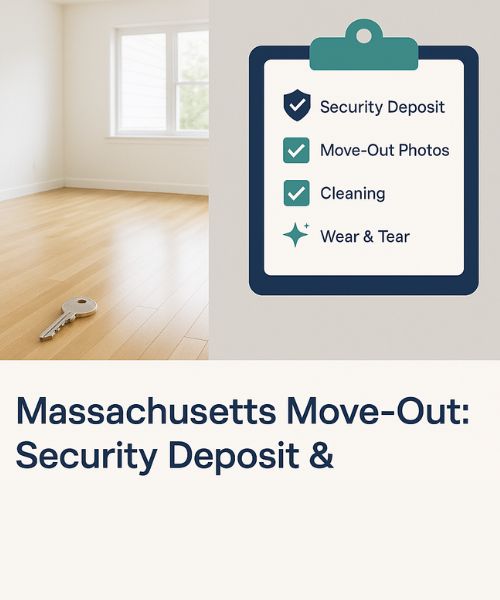For Massachusetts tenants, landlords, and property managers
If you’re moving in or out in Boston, your security deposit and end‑of‑tenancy “cleaning” expectations can make or break a smooth handoff. This guide explains exactly what Massachusetts law allows, what “normal wear and tear” really means after an August 2025 Supreme Judicial Court decision, and how professional cleaning fits in. For hands‑on help before key handover, book our Move‑In/Out Cleaning or, when buildup goes beyond routine, our Deep Cleaning.
1) What Massachusetts landlords can legally collect up front
Massachusetts limits up‑front charges to four items: first month’s rent, last month’s rent, a security deposit not exceeding one month’s rent, and the purchase/installation cost for a key and lock. See M.G.L. c.186, §15B(1)(b).
Why this matters: extra “move‑in fees,” “cleaning retainers,” or other add‑ons that don’t fit §15B risk being void or triggering penalties. If you want your place show‑ready without compliance gray areas, schedule a targeted One‑Time Cleaning before your walkthrough.
2) Security deposit handling rules that decide disputes
- Separate MA bank account + 30‑day bank receipt: Landlords must deposit the security deposit in a separate, interest‑bearing Massachusetts bank account and provide a receipt within 30 days identifying the bank, address, amount, and account number. Failure entitles the tenant to immediate return of the deposit. See §15B(3)(a).
- Annual interest: If held one year or longer, pay 5% annual interest or the lower bank interest; tenants may deduct unpaid interest from rent if not timely paid. See §15B(3)(b).
- Statement of Condition (move‑in baseline): Landlords must provide a Statement of Condition within 10 days of move‑in (or upon deposit); tenants have 15 days to return additions/objections. See Mass.gov guidance. This document anchors future damage claims.
Pro tip: mirror your move‑in photos on move‑out day after your One‑Time Cleaning or Deep Cleaning for easy condition comparisons.
3) The 30‑day return rule—and the only allowed deductions
Return deadline: Deposit (or balance) must be returned within 30 days after tenancy ends. See §15B(4).
Allowed deductions (closed list):
- Unpaid rent (not lawfully withheld)
- Unpaid increases in real estate taxes under a valid tax‑escalator clause
- Reasonable repair costs for tenant‑caused damage (normal wear and tear excluded)
Source: §15B(4)(i)–(iii).
Documentation required for damage: If deducting for damage, the landlord must provide a sworn, itemized list “under pains and penalties of perjury,” with bills, invoices, or estimates—within the same 30‑day window. See §15B(4) and Mass.gov.
4) The 2025 SJC decision: “Wear and tear” and “mandatory professional cleaning” clauses
On August 1, 2025, the Massachusetts Supreme Judicial Court clarified that deductions for reasonable wear and tear are not permitted and that lease provisions requiring end‑of‑tenancy “professional cleaning” (with automatic charges) conflict with §15B and are void. See Peebles v. JRK Property Holdings, Inc. (SJC‑13702).
Practical takeaway: A landlord cannot deduct routine “professional cleaning” fees from the deposit just because a lease addendum says so. Extraordinary filth or damage beyond ordinary wear (e.g., pet‑soiling requiring specialized treatment) can still be deducted if documented properly per §15B.
If your turnover in Downtown or Seaport needs a reset before keys‑back, our Move‑In/Out Cleaning aligns the property with inspection expectations while you keep airtight documentation.
5) Tenant playbook: Cleaning + documentation that protects your deposit
- Two weeks out: Re‑read your Statement of Condition; list target areas. Book a targeted One‑Time Cleaning for kitchen/bath and appliance interiors.
- 7 days out: Address stains/grease and soap‑scum. If buildup is significant, upgrade to Deep Cleaning and request “after” photos.
- Keys day: Photograph every room after cleaning (walls, floors, appliances, cabinets, bath fixtures). Keep email records when returning keys.
- After move‑out: Track the 30‑day clock for the deposit return or any sworn itemization. See §15B(4).
Real‑world examples from our blog:
6) Landlord checklist: Compliance steps that hold up
- Before move‑in: Provide the Statement of Condition; issue deposit receipt; deposit funds in a separate Massachusetts bank account and give the bank receipt within 30 days. See Mass.gov and §15B(3)(a).
- During tenancy: Track and pay annual interest (5% or actual bank rate). Tenants may deduct unpaid interest from rent after the 30‑day anniversary window. See §15B(3)(b).
- After move‑out: Within 30 days, either return the full deposit with interest or provide a sworn, itemized list with documentation for permissible deductions only. See §15B(4).
- Do not rely on “mandatory professional cleaning” addenda for deposit deductions; see Peebles (2025).
Need a fast, inspection‑ready reset between tenants in Charlestown or West Roxbury? Book Move‑In/Out Cleaning or schedule recurring turnover support via Recurring Cleaning.
7) Penalties for non‑compliance
Certain violations (e.g., failure to hold the deposit properly, failure to transfer a deposit on sale, failure to return on time) can trigger treble damages, 5% interest from the due date, court costs, and reasonable attorney’s fees. See §15B(6)–(7).
8) Cleaning: what can and cannot be charged to the deposit
Generally not deductible: routine turnover cleaning tied to reasonable wear and tear (e.g., wiping counters, typical bathroom/kitchen sanitation, light scuff removal).
Potentially deductible (with documentation): excessive filth or tenant‑caused conditions beyond normal wear (e.g., severe grease buildup, pet‑soiling requiring specialized treatment, damage repairs). See §15B(4) and Peebles (2025).
Unsure where your unit stands? We can assess and execute a documented Move‑Out Cleaning so expectations are clear to both sides.
9) “Fee in lieu of deposit”: authorized—verify current status
In 2024, the Legislature authorized the Executive Office of Housing and Livable Communities (EOHLC) to promulgate regulations permitting a fee in lieu of a security deposit, subject to conditions. See the Acts of 2024, c.150, §50 (Affordable Homes Act).
As of October 24, 2025, EOHLC’s public regulations index does not show an adopted regulation implementing this fee; verify current status on the EOHLC regulations page before using any “deposit alternative.”
Related reading from our blog
Ready for a frictionless handoff?
Massachusetts law defines the rules; documentation and realistic cleaning get you across the finish line. For a deposit‑safe turnover in Boston , Somerville, Quincy, Cambridge or Newton, book Move‑In/Out Cleaning. For heavy buildup or long tenancies in Seaport or Charlestown, our Deep Cleaning team handles the reset. Prefer to keep your next place deposit‑safe all year? Start a Recurring Cleaning plan.







